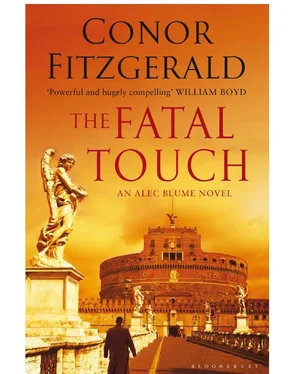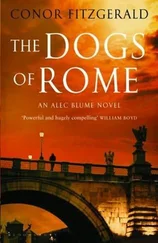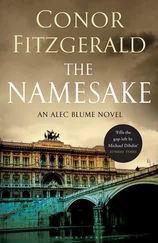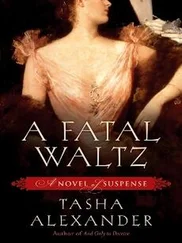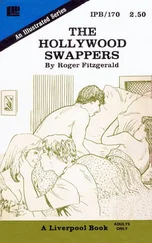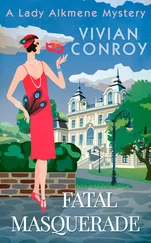Conor Fitzgerald - Fatal Touch
Здесь есть возможность читать онлайн «Conor Fitzgerald - Fatal Touch» весь текст электронной книги совершенно бесплатно (целиком полную версию без сокращений). В некоторых случаях можно слушать аудио, скачать через торрент в формате fb2 и присутствует краткое содержание. Жанр: Полицейский детектив, на английском языке. Описание произведения, (предисловие) а так же отзывы посетителей доступны на портале библиотеки ЛибКат.
- Название:Fatal Touch
- Автор:
- Жанр:
- Год:неизвестен
- ISBN:нет данных
- Рейтинг книги:3 / 5. Голосов: 1
-
Избранное:Добавить в избранное
- Отзывы:
-
Ваша оценка:
- 60
- 1
- 2
- 3
- 4
- 5
Fatal Touch: краткое содержание, описание и аннотация
Предлагаем к чтению аннотацию, описание, краткое содержание или предисловие (зависит от того, что написал сам автор книги «Fatal Touch»). Если вы не нашли необходимую информацию о книге — напишите в комментариях, мы постараемся отыскать её.
Fatal Touch — читать онлайн бесплатно полную книгу (весь текст) целиком
Ниже представлен текст книги, разбитый по страницам. Система сохранения места последней прочитанной страницы, позволяет с удобством читать онлайн бесплатно книгу «Fatal Touch», без необходимости каждый раз заново искать на чём Вы остановились. Поставьте закладку, и сможете в любой момент перейти на страницу, на которой закончили чтение.
Интервал:
Закладка:
“I facilitate happiness and perpetuate good taste,” said Nightingale. “That’s what I do. And I make money from it. Morally, I have no problems with what I do.” He looked over to his lawyer, who was regarding the stained fabric of his chair with fastidious distaste. “Explain it to him, Avvocato.”
“If you need a lawyer to explain your ethics, you’re probably not going straight to heaven,” said Blume.
“What Mr. Nightingale means,” said Feltri, smoothing the turbulence out of the air with a stroke of his hand, “is that he helps the buyer feel that his purchase is legitimate, which is the basis of all value in the art world. At the same time, he helps the dealer conclude a profitable transaction and some of that profit trickles down to artists, art hunters, and minor collectors who supply him. You are a policeman, so I hardly need remind you what a confirmation bias is, but let me explain the term, for the sake of Mr. Nightingale. It is simply this: People believe what they want to believe.”
“Well put!” said Nightingale from his corner.
Feltri gave a slight bow of acknowledgment. “Once someone gets an idea into his head, he-and I say he advisedly, because women in this respect are a little less susceptible than men-will see only evidence that confirms his belief, and remain blind to anything that contradicts it. I do not say ignore or deliberately overlook contrary evidence, but simply not see it for what it is. I am sure that happens often in your line of work.”
“I have heard of such things,” said Blume.
“Quite. So you know exactly what I mean. So if Nightingale were to discover a painting of dubious provenance, first he would need to persuade himself of its value. Then he would need to persuade another dealer or a buyer of the same. Once that is done he has no active role in what happens next. The dealers and buyers will consciously and unconsciously gather evidence to confirm what they want to believe. Once you have a true believer, there is often a bandwagon effect, with more and more becoming convinced of the same thesis, until it is established as fact. It is a self-fulfilling process, and the value he attached to it to begin with is often well below the value finally accorded to it by others. It has nothing to do with intelligence either. The more intelligent a buyer is, the more convincing his arguments in favor of the authenticity of the work he has bought.”
“And you are here because…?”
“Mr. Nightingale has provided you with a great deal of information. Far more than I would have liked. In return, he asks to see the notes Mr. Treacy left. We know they are in your possession, and were illegally removed from Treacy’s house.”
“Is that all?” said Blume.
“Look, Blume,” said Nightingale. “I have told you an awful lot. I don’t believe you are the designated investigator, and I am not even sure you have a right to those notes. I think it’s my right.”
“Almost all of what you told me I found out in Henry’s notes,” said Blume. “And no, you can’t have them. Not yet, at any rate. Tell you what though,” he pulled across his notepad and flicked it open. “I took some reader’s notes… and… Here we are… see if you can shed some light on this.”
“Why should I help you if you won’t help me?” said Nightingale.
“No reason,” said Blume. “None at all. It’s just your lawyer’s little speech reminded me of a passage by Henry-Harry, you call him-which ends with a slightly mysterious note. Ah, here it is. Now just before the passage he has made a sort of note, in which he lays down three laws for a forger. I copied them out but I’m not sure I follow them. But they appear again in his third volume, which was evidently the first draft of a handbook for forgers and painters. Avvocato, I am afraid this is in English. I hope you can follow:
“Basic rules for forgers, interpreters, emulators, admirers, and genuine artists:
1. Authentic materials count for more than quality.
2. Quality will eventually move general opinion, but it may take time.
3. General opinion is more important than authentic materials.
“Is it me, or is there something a bit circular going on there?” said Blume.
Nightingale shrugged and said, “Harry liked to sound wise. He had almost no education, you know.”
For some reason, Blume found himself wanting to defend Treacy, or at least ruffle Nightingale’s air of self-satisfaction. On impulse, he pulled the notebooks out of his drawer and placed them on his desk.
Nightingale jumped out of his seat and came over. His lawyer, too, stood up and approached the desk.
“Are those the notebooks?” asked Nightingale.
“These?” said Blume absently. “Yes. They are. Sit down both of you. Avvocato, si sieda, per favore. And you, too, Nightingale, sit down.”
This time Nightingale chose the chair next to his lawyer, as close to the desk as possible.
Slowly, though he knew where to look, Blume turned over the pages, tapping passages with his finger as if searching for a word. Finally he said, “Ah. Here it is. Allow me to read to you.
“One of the simplest and best ways of building up provenance and value for a painting was to buy it. This was a trick at which John excelled. I don’t think he ever used the same route twice for getting a painting into an auction, so there was no clear pattern-not that this was of any real concern to the auction houses, which often place false bids themselves to push up prices. Nowadays they and dealers do it all the time. They have to, because they have invested in contemporary art which they all secretly know is intrinsically worthless.
“We dealt mainly in legitimate art, so John, or someone he was paying to bid on his behalf, was often to be found at auctions buying works. Sometimes he would pay over the odds for a work, and then sell it for less. But not often.
“Let’s say I had created a ‘Corot’ landscape, which is the easiest thing in the world, in my opinion…”
Blume looked up startled as Nightingale barked like a seal, “Hah! He could never do a Corot. I told you, he couldn’t paint air. Too much weather even in old Corot for Harry. The man is a pathological liar.”
“Shall I read on?”
Nightingale muttered something, and when he stopped, Blume continued:
“Nightingale would bring the painting to a dealer friend who, for a fee, would agree to pass it on to another dealer who, again for a fee, would pass it on to a ‘buyer’ who would then decide to sell it to the auction house, setting a minimum price. John would turn up and bidding would begin. If there were no takers, one of John’s hidden agents would bid against us until they reached a suitable price. Now the painting had a history and a value ascribed to it. There was no legal danger in this, because if the painting was exposed as a fake John came across as victim. But there was a moral danger. If everyone knows you are buying a fake, then you are either a poor swindler or a sorry victim. Swindler is a term you can live with in the art world. Victim, no. No one likes a victim.
“I think it’s fair to say that the more important a person is, or is supposed to be, the less I shall like him or her. I particularly detest self-important artists, those self-advertising modernists who think they have something to say because they are too ignorant of art history to know it has already been said and done, and vastly better, by others. Worse still, of course, are the Nihilists, the showmen, the charlatans, shit artists like Pietro Mazoni, whom I once had the misfortune to meet at a dinner party. But I was very honored to meet Giorgio de Chirico. This is a man who has recognized the crisis in art. He accepts my argument that since there is nothing more to say and nothing can be better done than it already is, the only solution is to become surreal or to imitate. De Chirico manages both and, to top it all, he forges his own work, signing other people’s paintings with his name (only if they ask, of course, for he is a gentleman).
Читать дальшеИнтервал:
Закладка:
Похожие книги на «Fatal Touch»
Представляем Вашему вниманию похожие книги на «Fatal Touch» списком для выбора. Мы отобрали схожую по названию и смыслу литературу в надежде предоставить читателям больше вариантов отыскать новые, интересные, ещё непрочитанные произведения.
Обсуждение, отзывы о книге «Fatal Touch» и просто собственные мнения читателей. Оставьте ваши комментарии, напишите, что Вы думаете о произведении, его смысле или главных героях. Укажите что конкретно понравилось, а что нет, и почему Вы так считаете.
